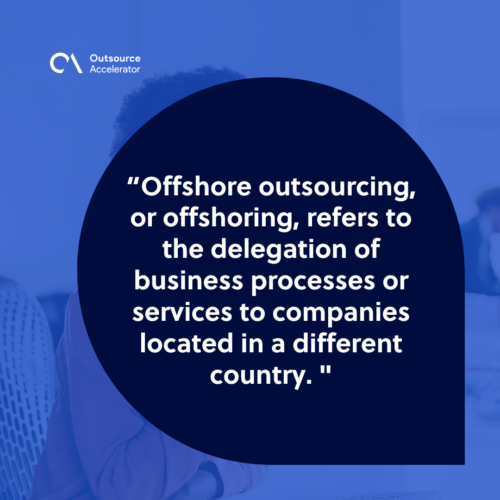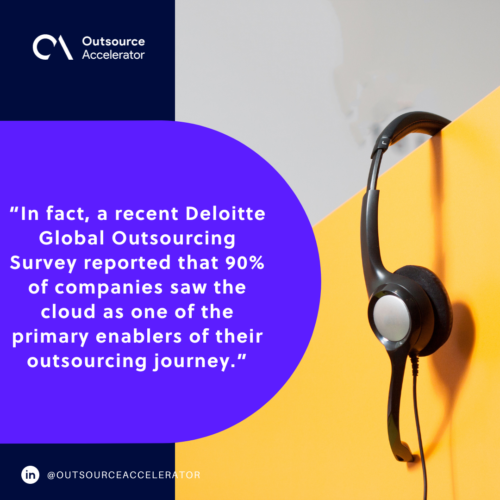Learn about the different offshore outsourcing models

Ever felt like there’s just not enough hours in the day to conquer your business goals?
Well, you’re not alone!
In today’s bustling world, where competition is fierce and time is of the essence, companies are turning to offshoring to level the playing field.
Imagine a virtual team located in faraway lands, working diligently to bring your business objectives to life while you focus on what truly matters. It’s like having a secret weapon hidden in your arsenal!
Offshoring has become so reliable. A LinkedIn post revealed that 78% of businesses worldwide feel positive about their outsourcing partners.
So, let’s embark on a journey to explore the various offshore outsourcing models available to businesses today. We’ll delve into each model’s advantages and potential risks so that you can make informed decisions for your business.
What is offshore outsourcing?
Offshore outsourcing, or offshoring, refers to the delegation of business processes or services to companies located in a different country. It is often done to take advantage of:
- Lower labor and operational costs
- Specialized skills
- Tapping into emerging markets
By offshoring certain tasks to firms like Offshore MVP, companies can focus on core competencies and enhance efficiency.
Offshore outsourcing models are specific approaches or frameworks organizations can adopt to delegate business tasks or processes to a service provider in a different country.
These models help businesses benefit from offshoring while meeting their specific needs and goals.

5 types of offshore outsourcing models
Several offshore outsourcing models exist, each with its unique characteristics and implications. Let’s explore the five most common types:
1. Dedicated team model
In this model, a dedicated offshore team is formed to work exclusively for a particular client. The team works as an extension of the client’s in-house workforce, aligning with their business goals and processes.
This offshore outsourcing model provides better control and seamless collaboration while enhancing time zone coverage and scalability.
2. Project-based model
Businesses employ the project-based model for specific endeavors or tasks. It offers flexibility as it allows organizations to tap into specialized skill sets for short-term engagements.
This framework is suitable for companies looking to execute specific projects or requiring expert assistance for a limited duration.
3. Build-Operate-Transfer (BOT) model
The BOT model involves partnering with an offshore service provider to establish an offshore subsidiary.
The provider handles the subsidiary’s initial setup, recruitment, and operations, allowing the client to focus on core business activities.
Once the offshore team is established and running smoothly, the client has the option to transfer the operations entirely to their ownership.
4. Staff augmentation
Staff augmentation allows companies to fill skill gaps in their existing teams by outsourcing specific roles or expertise.
This offshore outsourcing model is beneficial when there’s a temporary need for additional resources. It could apply to something such as hiring a team of data scientists for a short-term analytics project.
5. Cloud offshoring
Cloud offshoring leverages cloud computing services to manage and deliver various business functions. Companies commonly outsource data storage, software development, and infrastructure management tasks to cloud service providers.
In fact, a recent Deloitte Global Outsourcing Survey reported that 90% of companies saw the cloud as one of the primary enablers of their outsourcing journey.
This statistic proves that this offshore outsourcing model can offer scalability, cost-efficiency, and the ability to access resources on demand.
An organization can use a cloud outsourcing model to host and manage its web applications, benefiting from the provider’s infrastructure and expertise.

Benefits of using offshore outsourcing models
The offshore outsourcing models mentioned are each tailored to specific business requirements. Let’s dive into the benefits that can be reaped from utilizing these models:
Cost savings
One major factor prompting companies to choose offshoring is the chance to achieve substantial cost reductions.
Labor costs in some offshore locations, such as India, the Philippines, and Eastern Europe, can be substantially lower than in developed countries. This allows businesses to allocate resources more efficiently and invest in other critical areas.
Did you know? You can use Outsource Accelerator’s Outsource Calculator to compute your outsourcing expenses and savings!
Access to a global talent pool
Offshore outsourcing provides access to a diverse and skilled talent pool that may not be readily available locally. This can be especially advantageous for specialized tasks or projects requiring specific expertise.
For instance, Google works with remote teams in the Asia-Pacific region to manage their app development, software development, and analytic consultancy services.
By 2018, the tech giant’s outsourced workforce had become larger than its core team.
Focus on core competencies
Outsourcing non-core functions allows companies to streamline their operations and focus on core competencies. This strategic shift enables organizations to enhance their overall efficiency and competitiveness in the market.
For example, a software company can concentrate on product innovation while outsourcing routine software testing activities.
Enhanced flexibility and scalability
Using offshore outsourcing models lets organizations scale their operations quickly and effortlessly.
As business demands fluctuate, companies can easily adjust their workforce by ramping up or scaling down their offshore team. Flexibility enables businesses to adapt to market changes rapidly.
For instance, a customer support company can expand its offshore team during peak seasons to handle the increased volume of customer inquiries.
By doing so, they can ensure uninterrupted service and customer satisfaction.
Risks of offshore outsourcing
While leveraging offshore outsourcing models offers several advantages, being aware of the associated risks is crucial. Here are a few potential risks to consider:
Communication and language barriers
Engaging with an offshore team may introduce communication challenges due to cultural and language differences. Misunderstandings, project delays, and incomplete deliverables can arise if communication barriers are not addressed effectively.
It is crucial to establish open lines of communication, promote clarity, and encourage proactive collaboration to mitigate these risks.
Data security and confidentiality
Sharing sensitive business information with an offshore team entails the risk of data breaches and intellectual property theft.
Choosing a reliable service provider with robust security measures and stringent data protection protocols is vital to safeguard sensitive information.
Implementing nondisclosure agreements and conducting regular security audits can further enhance data security.
Quality control
Ensuring uniform quality standards among teams across different locations can be challenging. Variations in work ethics, skill levels, and cultural differences might impact the overall quality of deliverables.
Implementing stringent quality control processes, regularly monitoring performance, and providing concise feedback can help maintain the desired quality level.
Dependency on external providers
Overreliance on external service providers can pose a risk if the vendor encounters financial difficulties, operational challenges, or other issues.
To mitigate this risk, companies should diversify their outsourcing portfolio, maintain relationships with multiple vendors, and have contingency plans in place.
How to choose the best offshore outsourcing model
To choose the most effective and suitable fit among available offshore outsourcing models, businesses should consider the following factors:
Define your objectives clearly
Clearly defining your business objectives is essential before choosing among the offshore outsourcing models.
Determine whether you’re looking for cost savings, access to specific skills, or a combination of factors. This clarity will guide your decision-making process.
Evaluate vendor expertise
Assess the expertise of potential offshoring partners in your industry or domain.
Look for vendors with a proven track record, relevant experience, and a portfolio that aligns with your business needs.
Checking client testimonials and case studies can provide insights into their capabilities.

Consider cultural compatibility
Cultural compatibility is a critical factor in successful offshoring.
Choose a location and vendor with a cultural fit that aligns with your company values. This ensures smoother communication, collaboration, and understanding between teams.
Assess communication channels
Effective communication is paramount in offshore outsourcing. Evaluate the communication channels and tools used by potential vendors.
Ensure that they are accessible during overlapping working hours and have a clear communication protocol in place.
Evaluate data security measures
Believe it or not, a hacker attack happens every 39 seconds. Cyber attacks per year have also shot up to around 800,000.
Given the increasing concerns about data security, it’s important to thoroughly evaluate the data security measures implemented by potential offshoring partners.
Ensure they comply with industry standards and regulations, and discuss the steps they take to protect sensitive information.
The future of offshore outsourcing
The future of offshoring is looking pretty bright, thanks to tech advances and the global village we’re all part of. Companies will likely keep jumping on the offshore bandwagon to stay nimble in the ever-changing business scene.
What’s more, automation and AI are shaking things up, doing the heavy lifting for routine tasks. This lets offshore teams focus on more complex and value-driven activities.
Plus, better communication tech is making it easier for onshore and offshore teams to have seamless collaboration.
Embracing offshore outsourcing models will allow organizations to:
- Leverage global talent
- Explore new markets
- Optimize costs
- Drive innovation
However, it is essential to remain adaptable to new trends and growing customer expectations in this ever-evolving landscape.
To boost competitiveness and find success globally, businesses should be open to grasping various offshoring models. They must weigh the pros and cons and adopt a thoughtful approach to selection.







 Independent
Independent




